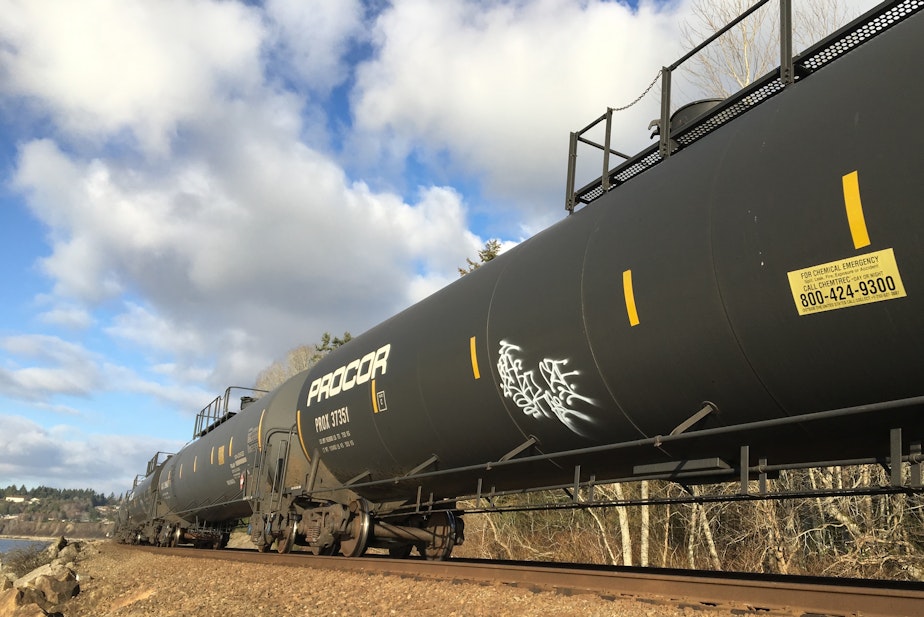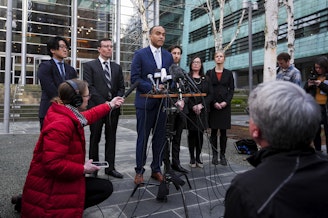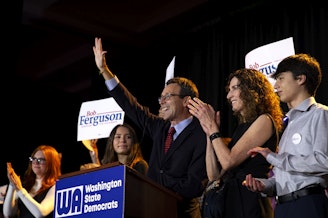Trump’s proposed Canada tariff could boost Northwest energy bills

President Donald Trump’s proposed 25% tariff on Canadian imports could be an expensive proposition for the Pacific Northwest, which depends heavily on its northern neighbors for energy supplies.
More than two-thirds of the Northwest’s natural gas comes from Canada, according to the Northwest Gas Association. Nearly half of the crude oil refined in Washington state is Canadian, according to the Washington Department of Ecology.
Nationwide, one-fifth of the United States’ oil supply originated in Canada in 2023, according to the Energy Information Administration.
Slapping hefty tariffs on these imports would likely boost the energy bills of Northwest consumers and businesses.
On Jan. 20, his first day in office, President Trump said he was looking to impose 25% tariffs on Canada and Mexico on Feb. 1.
In November, he had pledged to impose tariffs on all products from the United States' two neighbors on Jan. 20.
RELATED: Why Trump's tariff promises will be hard to keep
“Instead of taxing our citizens to enrich other countries, we will tariff and tax foreign countries to enrich our citizens,” Trump said at his inauguration ceremony.
“It will be massive amounts of money pouring into our treasury coming from foreign sources,” Trump claimed, though American tariffs are paid by American importers and their American customers.
“It’s a stupid idea,” said U.S. Rep. Rick Larsen, a Washington Democrat.
Larsen represents the northwest corner of Washington state in Congress, including all four of the Pacific Northwest’s large oil refineries.
Oregon and Idaho refine no oil, while U.S. Oil operates a small refinery in Tacoma.
“It's going to end up costing more for everything for people I represent,” Larsen said.
“Tariffs are on us,” said Jennifer Bettis, research manager at the Border Policy Research Institute at Western Washington University. “Tariffs are imposed on goods once they arrive in the United States and are paid for by the companies that import said products, and they can choose to pass on that increase in price to consumers.”
RELATED: Is Trump's rhetoric on Greenland, Canada and Panama Canal a 'Madman Strategy'?
“Canada is our largest trading partner, where we see about $29 billion of imports and exports between our two jurisdictions,” said Washington Commerce Director Joe Nguyen, a former Democratic state Senator.
Nguyen said his department was still assessing the situation.
“This would certainly make it much more difficult for us in terms of our residents and affordability,” he said.
Washington state’s biggest import from Canada is natural gas, with crude oil second, and wood products a distant third.
“We are talking to our members but do not have a position yet as we don’t yet know exactly what will be implemented,” Western States Petroleum Association spokesperson Denise Davis said by email.
Spokesperson Cesar Rodriguez with BP, which operates the Northwest’s largest refinery at Cherry Point, Washington, declined to comment.
Melanie Coon, a spokesperson for Puget Sound Energy, which sells Canadian natural gas to 900,000 customers in Washington and burns natural gas to generate 30% of the electricity it sells, declined to be interviewed.
“We have no information on the tariffs at this point and do not want to speculate on the terms or potential impacts,” Coon said by email.
RELATED: What's next for Canada? 5 questions will help decide the future after Trudeau
“The President, when he ran, said he was going to, I think, cut energy prices in half, and by imposing these tariffs, he's promising higher prices for people who are buying gas for their cars or even trying to heat their homes with natural gas,” Larsen said. “None of this makes sense.”
White House Press Secretary Karoline Leavitt did not respond to a request for comment.
If the United States does impose tariffs, leaders of Canada and Mexico have both said they would hit back with tariffs of their own.
“There's so much that we have to do,” said Nguyen, a week into his job as Washington’s commerce director. “Having to deal with a tariff trade war was not on my list, but it is now.”
In an Ipsos poll released Tuesday, 55% of Canadians said they believed Trump’s threat was a bluff to get Canada to act on other issues such as boosting border security and defense spending.
In November, Trump said on his social media platform that he would impose tariffs on Canada and Mexico until the flows of drugs and illegal immigration across U.S. borders were stopped.
A 25% cost increase on the $19.9 billion in Canadian imports in 2023 would work out to costing each Washington state resident an additional $2,546.
While Trump has signed a flurry of executive orders aimed at boosting fossil-fuel production and use despite the increased pollution that would bring, these tariffs could have the opposite effect. By raising the price consumers pay for these fuels, the proposed tariffs could lower fossil-fuel consumption and the planet-heating pollution it causes.



